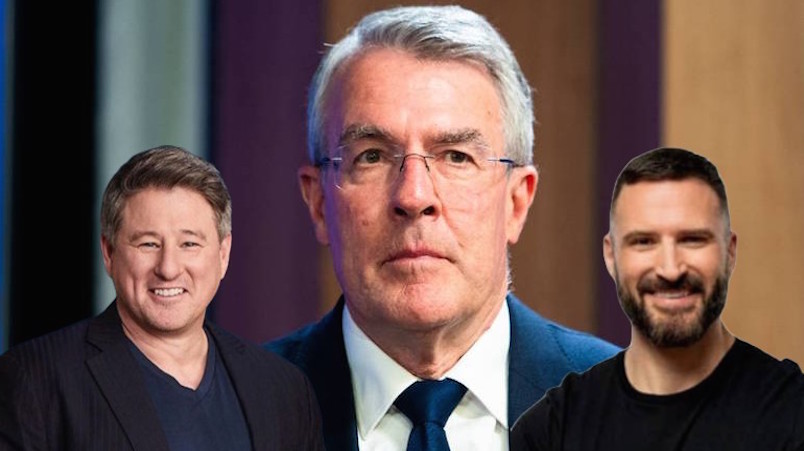Nine CEO Sneesby confident as privacy reform looms, AANA chief Faulks less so as industry nerves fray

Three speed reforms incoming? Left to right: Nine chief Mike Sneesby, Attorney-General Mark Dreyfuss, AANA CEO Joshua Faulks.
Attorney-General Mark Dreyfus will tonight field questions about how privacy reforms might play out as industry holds its breath. Whether government has the appetite ahead of an election to match increasingly hard rhetoric will start to become apparent next week, when the proposals are expected to land in parliament. Either way Nine CEO Mike Sneesby appears more relaxed than Australia's major advertisers and the broader supply chain. "I feel good that we're on the front foot," per Sneesby. One-time Attorney-General staffer Joshua Faulks, now CEO at peak advertiser body the AANA, is less confident – and criticised the department for "pretty average" attempts at industry consultation given the stakes.
Sneesby at ease
Ahead of imminent privacy reforms, expected in parliament next week, Attorney-General Mark Dreyfus will tonight be fielding questions at The Sydney Institute about what's about to land.
Sentiment appears to be shifting with some now expecting a three-phased approach to privacy reform, with a slimmed down first regulatory batch giving government and industry more time to implement – and counter – changes that threaten to upend current advertising and marketing practices reliant on tracking and trading of personal data. Data like what we look at online, who we are friends with, where we shop, what we buy, where we are at any given time, where we live and how much money we earn.
But while brands are fearful of “unintended consequences” and severe limitations on personalised advertising and targeting, Nine CEO Mike Sneesby is confident the broadcaster can handle whatever is ultimately tabled.
Asked by Mi3 whether Nine Entertainment – which has previously claimed the largest first party data set of any local publisher – had scoped and prepared for what’s about to land, Sneesby said: “Yes we have, and we’ve been paying very close attention to what the implications are.”
“We've been quite proactive around how we look at our terms of use, and how we think about the permissions for use of data across the board,” Sneesby continued.
“Obviously we don't know what the specifics will be until they're finalised, but I'd say as a general rule, Nine, across all of our platforms, whether you [are] signed in as a paying subscriber, or in the terms of use on [our] websites or logged-in on [our] free sites, we've always been very proactive in how we think about disclosing the uses of people's data and about how that is disclosed. So I feel good that we're on the front foot – but we won't know what comes out until it's [passed parliament].”
Advertisers aggravated
Sneesby’s was a more upbeat assessment than offered by Joshua Faulks, head of peak body the AANA, representing the biggest spending advertisers in Australia.
Faulks criticised the Attorney-General’s department for talking about going “harder than Europe” on privacy regulation while giving industry little chance to head off “unintended consequences.”
While the direction of travel has been well signalled, said Faulks, businesses need detail in order to react and prepare appropriately given the potential scale of disruption. Clampdowns for hashed emails, use of geolocation data, loyalty data trading and new definitions of personal information are all expected, as well as a more nuanced catch-all: fair and reasonable use of data, which will trump consent, and carry significant legal and financial penalties for those that are deemed to fall foul of it, potentially via class actions led by no-win no fee lawyers.
All of which presents massive risk for compliance departments – which they cannot yet properly assess.
“Certainty, that’s what brands need at the moment. It’s pretty hard to plan without that, when you don’t really know [what the specifics will be]. The government has set out how they might respond, but the devil is in that detail,” said Faulks at a Carsales-hosted panel session.
“They [the Attorney-General’s department] have proposed very expansive definitions of personal information … and added to consent [requirements], that basically locks down targeting for us, which is pretty bad.”
Not just because it threatens much of the foundation of digital advertising, but because it would mean advertisers can’t use reverse or exclusion targeting to avoid showing gambling ads to problem gamblers, or alcohol ads to kids, per Faulks. “That’s something we’re quite concerned about.”
Meanwhile, consultation from the A-G, “has been pretty average”, he lamented.
“We had a roundtable with the Attorney-General and he gave a commitment to consultation. But no one knows what’s coming in September. “
That’s a problem, said Faulks, because “it will have a big impact on this industry.”
“We've all been talking to government saying we need to know what's going on so we can tell you about what the unintended consequences are going to be,” said Faulks, a former deputy chief of staff at the Attorney-General's department a decade ago under George Brandis.
“I totally agree [reform] needs to align what's happening around the world. A lot of [advertisers are] global brands and [advertise via] global platforms. So we need that consistency.”
He questioned the wisdom of implementing a tougher regime than Europe's GDPR, as indicated in May by Privacy Commissioner, Carly Kind. “Europe is already going pretty hard,” warned Faulks.
Next week should give some indication of government’s appetite to match the A-G's rhetoric.



